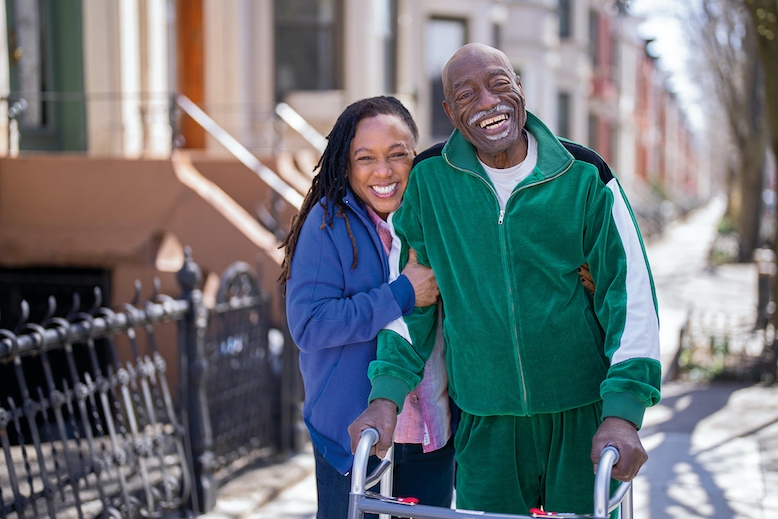Why Self-Care Matters for You and Your Loved One

Imagine that caregiving is like a play. You and your loved one are the stars. Other family members and your loved one’s care team play supporting roles. The different scenes include doctor’s appointments as well as the interactions you have with your loved one and everyone else. For this play to go on, everyone needs to be healthy. So a big part of your caregiving experience involves taking care of your own physical and mental health. The phrase “self-care” might make you think of unnecessary or selfish activities. But having a good self-care routine affects more than just your own health and well-being. It will also benefit your loved one also. Here’s how. Self-Care Helps You Avoid Burnout As a caregiver, you have to invest in self-care, starting in the broadest sense. It’s so easy to get lost in a round-the-clock role — which can leave you feeling stressed, overwhelmed and even burned out. You need a good balance between your health and your loved one’s. When you’re under constant pressure and not taking care of yourself physically and mentally, burnout can creep up on you. Feeling tired, angry, or overwhelmed can be signs of burnout. If you can’t remember the last time you felt happy or did something just for you, you’re overdue for a little “me time.” Self-care doesn’t have to be involved. It might mean watching your favorite movie, riding your bike, or going to bed early. Self-care is about making time every day for little things to focus on your own health. Self-Care Can Improve Your Relationship with Your Loved One As a caregiver, you may find that although you’re with your loved one a lot, your time with them isn’t spent on fun or pleasurable activities. And when you’re not with them, you might be thinking or worrying about them. Your caregiving role might take up a huge part of your life and brain space, and some days, you may find yourself resenting that. No one does their best communicating when they’re stressed out. When you’re overwhelmed, you might find that your temper is shorter. You might notice you and your loved one clashing over little, unimportant choices. A disagreement about what socks your loved one wants to wear probably isn’t about the socks. It might be about you feeling like they’re taking up too much of your time or feeling annoyed they won’t let you choose the socks so you can move to the next task. A better self-care routine can actually help improve your relationship with your loved one — and keep the small day-to-day challenges from becoming total blowouts. Simply put, you need to take time to rest and recharge. You need time in your schedule to focus on yourself, instead of only (or mostly) on your loved one. When you make self-care a priority, you may be able to lower your overall stress level and develop calming habits that can help you in tough moments. Caregiving will change the relationship you have with your loved one, but it doesn’t have to ruin it. Taking time for yourself can help you appreciate time spent with your loved one even more. Self-Care Can Help You Be a Better Caregiver The bottom line is that self-care can help you be a better caregiver. You’ve probably heard things like “You can’t help someone else until you help yourself” or “You can’t fill someone else’s cup if yours is empty.” Although these may be clichés, there is some truth to them. When you aren’t feeling your best, you can’t provide your best care to your loved one. Being burned out can leave you feeling tired, short-tempered, and even resentful. Although setting time aside for self-care might feel selfish or self-indulgent, it can help you feel better, have a more positive outlook, and live a healthier life.
Best Qualities of a Good Caregiver

Because caregivers help their loved ones with all kinds of tasks, what qualities make a good caregiver depends on what their loved one needs. Some caregivers pay bills. Others keep tabs on medication. Still, others live with their loved ones, providing company as well as hands-on care. No matter the amount of care needed, stress is part of the job. A 2020 study by AARP found that nearly one in four family caregivers say that caregiving has affected their health. Some caregivers get depressed or angry. Others put off doctor’s visits or have trouble maintaining healthy habits. But some caregivers find satisfaction and even pleasure in their duties. What qualities does a caregiver need? Personality Traits of a Good Caregiver Patience People who need care often take longer to complete simple tasks. They may ask the same questions over and over. Good caregivers need the patience to deal with anything from a loved one’s memory lapses to angry outbursts. They practice staying calm and avoiding frustration. Compassion Empathy and understanding are absolutely necessary. Even when caring for an abusive person, caregivers try to remain empathetic and understanding. Humor Finding something to laugh about can make a tough situation bearable. A sense of humor keeps a caregiver emotionally strong and is a great stress buster. Being Present Good caregivers know the importance of respecting their loved one’s current abilities. Rather than focusing on what their loved one can no longer do, a good caregiver tries be in the moment with them — looking at photos, listening to music, cooking a favorite meal, remembering that they weren’t always sick. Detail Oriented Good caregivers are good managers. They create schedules, plan for emergencies, and organize information so they don’t have to scramble. Able to Accept Help Asking for help is not a sign of weakness. A good caregiver realizes they can’t do it all alone. They line up friends, family, or professionals to step in when they need a break. Willing to Set Boundaries Caregiver should respect their own limits and say no to demands when necessary. Cooperative A good caregiver is part of a care team that may include doctors, family, and friends. Being understanding and flexible goes a long way toward being a successful team player. Assertive Good caregivers advocate for their loved ones. They ask questions and expect answers. Good caregivers learn about their loved one’s condition, and they make sure their loved one gets the care they need. Physical Traits of a Good Caregiver Physically Fit Caregivers may make many trips up and down stairs every day. Others need to help their loved one move from the bed to a chair. Helping with these transfers can lead to injuries. Being physically fit can make things easier, but it isn’t always enough to avoid getting hurt. Caregivers need to learn how to manage these chores safely or know when to get help. In Good Health Staying healthy might be the most important quality of a good caregiver. It’s important to eat well, get enough sleep, and exercise regularly. Making and keeping your own doctor’s appointments is also key. And a good caregiver finds time to do things they enjoy. A person can’t take care of others well if they don’t take care of themselves. Source: www.vnshealth.org
When You Need More Support Than Just a Self-Care Routine

Sometimes when you’re a caregiver, a self-care routine isn’t enough. If you are feeling stressed at the moment, going for a walk or doing a deep breathing exercise can help you focus and be present. Making small changes to your routine that prioritize your physical, emotional, and mental health is never a bad idea. But when your caregiving duties are leading to feelings of burnout or affecting your health, you might need more support than just a self-care routine. It’s important to know what your options are. Join a Caregiver Support Group You might feel like you can’t talk about your caregiving challenges with your family and friends because they don’t have similar experiences. This can make caregiving feel especially lonely. Joining a caregiver support group can help you meet other people who understand what you’re going through. There are many kinds of support groups for caregivers. You may find one that meets locally or one that meets virtually online. Some are led by a professional moderator and some by a peer leader. You can even find a support group that is specific to: Seeking out new connections, relationships, and even friendships with other caregivers is a big part of caring for yourself and can help you feel less overwhelmed and isolated. Having a space where you can just talk and be yourself can have a huge impact on your mental health and be a major part of your caregiving journey. Consider Professional Home Care When you’re trying to take care of yourself and a loved one, you may feel like you simply don’t have enough time in the day. Especially as your loved one’s condition advances — or if they have a relapse or setback — you may find yourself too busy or stressed out to think about yourself. When are you supposed to find time or energy for a self-care routine when your schedule is already packed? If this sounds like you, it may be time to consider additional care for your loved one. Self-care activities like taking a bubble bath aren’t going to help if you’re constantly worrying about your loved one falling or never having a break in your schedule. Realizing that you need more support can be tough, but professional care can help you with anxious feelings and your busy caregiving schedule — especially as your loved one needs more assistance. You’re not a bad caregiver for not being able to do everything. In fact, knowing when you need more support can help you make sure your loved one is getting the best care possible. Even occasional respite care can give you some time to rest and recharge. Talk to a Counselor or Therapist Although a self-care routine can help you handle and recover from everyday stress, you may find yourself with feelings of depression or anxiety that self-care just can’t address. If you are noticing feelings of anxiety, sadness, or worry that just won’t go away, you may want to talk to a professional mental health expert like a counselor or therapist. If you’ve never talked with a therapist before, you might wonder what they do. A professional therapist or counselor can help you: Talking to a therapist can be beneficial for anyone. You don’t have to have a specific mental health diagnosis for counseling to be a helpful tool in your caregiving toolbelt. You may be nervous about sharing your feelings, and you’re not the only one. Remember that a therapist is trained to help people in tough times. They are there not to judge you but to help you develop strategies and skills that can make life easier. Schedule — and Attend — Your Annual Wellness Visit Self-care isn’t just about taking care of your mental health. It’s about taking care of your physical health too. In fact, many caregivers are so focused on their loved one’s health that they neglect their own, often skipping regular appointments and routine screenings. Source: www.vnshealth.org
